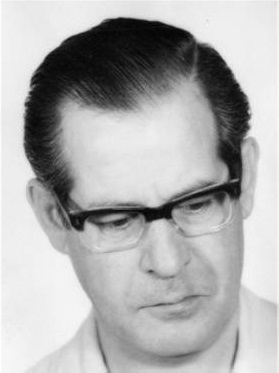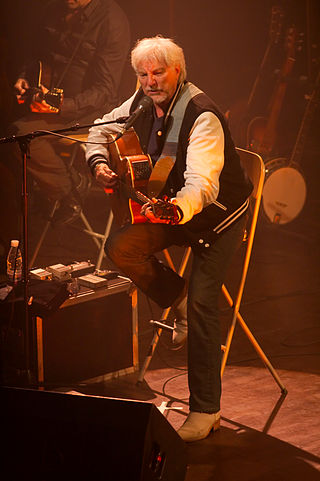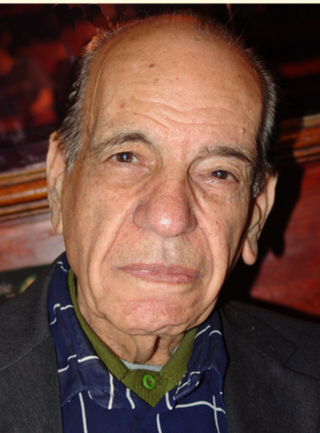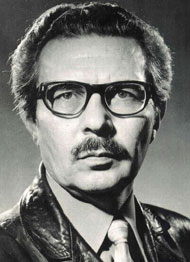
Morteza Hannaneh was an Iranian composer and musician.

Roman Ghirshman was a Ukrainian-born French archeologist who specialized in ancient Persia. Ghirshman spent nearly thirty years excavating ancient Persian archeological sites throughout Iran and Afghanistan.

Ndombolo, also known as dombolo, is a genre of dance music originating in the Democratic Republic of the Congo. Derived from soukous in the 1990s, with fast-paced hip-swaying dance rhythms, often accompanied by upbeat, percussion-driven music, the style became widespread in the mid-1990s and the subsequent decade, dominating dancefloors in central, eastern, and western Africa. It inspired West African popular music, coupé-décalé, Kuduro, and East African dance music.

Khosrow and Shirin is the title of a famous tragic romance by the Persian poet Nizami Ganjavi (1141–1209), who also wrote Layla and Majnun. It tells a highly elaborated fictional version of the story of the love of the Sasanian king Khosrow II for the Christian Shirin, who becomes queen of Persia. The essential narrative is a love story of Persian origin which was already well known from the great epico-historical poem the Shahnameh and other Persian writers and popular tales, and other works have the same title.

Hugues Jean Marie Auffray, better known as Hugues Aufray, is a French singer-songwriter and guitarist.

Mohammad Mokri was an Iranian scholar (Kurdologist) and author born in Kermanshah. He wrote over 100 books and 700 articles during his lifetime. He worked very closely with the Prime Minister of Iran Mohammad Mossadegh until his removal from power on August 19, 1953 during Operation Ajax.

Samin Baghtcheban was an Iranian composer, author and translator.
Suzanne Bélair, called Sanite Bélair,, was a Haitian revolutionary and lieutenant in the army of Toussaint Louverture.

Fally Ipupa N'simba, known professionally as Fally Ipupa, is a Congolese singer-songwriter, dancer, philanthropist, guitarist, and producer. Often referred to as the "Prince of Rumba", he is noted for his tenor vocals as well as his blend of contemporary and traditional Congolese music genres, including Congolese rumba, soukous, and ndombolo. His lyrics often cover themes of romance, suffering, and joy.

Gilbert Lazard was a French linguist and Iranologist. His works include the study of various Iranian languages, translations of classical Persian poetry, and research on linguistic typology, notably on morphosyntactic alignment. He also studied various Polynesian languages most notably the Tahitian language.

Delphine Minoui is a French journalist specializing in the Iranian world.

Azadeh Kian-Thiébaut is an Iranian-French academic, Professor of Sociology, Director of the Social Sciences department and Director of the Center for Gender and Feminist Studies at the University Paris Cité. She is included and recognized in the BBC project 100 Women.

Jean During is a French musician and ethnomusicologist specialising in music from the nations of the East especially Iran, Central Asia, Afghanistan and Azerbaijan. A commentator on the Middle Eastern and South Asian cultures, he is the Research Director at the French National Center for Scientific Research and a professor at the University of Strasbourg.

Fariba Adelkhah is a French-Iranian anthropologist and academic at Sciences Po who was detained in Iran from 2019 until 2023.

Dr. Mahnaz Shirali is an Iranian author and political sociologist. She graduated in architecture engineering from faculty of fine arts of Tehran University in 1992. She moved to France in 1994 where she obtained her PhD in sociology from School for Advanced Studies in the Social Sciences in Paris in 2000. Her PhD thesis was about crisis in youth Iranian generation.
Pièrre Lecoq is a Belgian philologist, historian, and Iranologist.

Chahla Beski-Chafiq, better known by her pen name Chahla Chafiq, is an Iranian writer living in France. She has chosen the pen name "Chafiq" in honor of her mother, Shafiqeh ("compassionate").
Anahita Ghabaian Etehadieh in Tehran) is an Iranian gallery owner and curator. She holds a Bachelor's degree in Computer Science and a PhD in History from the Paris Diderot University. Ghabaian established the Silk Road Gallery in 2001.
Christophe Balaÿ, was a distinguished French professor, linguist, and translator known for his contributions to Persian language and Iranian literature. Trained as a comparatist, he held prominent positions, including Professor of Persian at Institut national des langues et civilisations orientales (INALCO), Director of the Institut Français de Recherche en Iran, and Vice President for Research at INALCO.

The Anoumabo Urban Music Festival or Festival des musiques urbaines d'Anoumabo (FEMUA) is an Afropop music festival that was created in 2008. It is held mainly in Abidjan, Ivory Coast. It brings together important contemporary artists from Africa and around the world for a week, usually in Anoumabo in the south of Abidjan. It is one of the largest music festivals in Africa, with more than 40,000 spectators in 2017. Admission to the concerts is free and some artists donate their royalties to a local development project. An annex of the festival, Femua Kids, is intended for children.
















